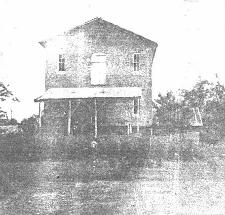Preston Mill
Springfield News & Leader
April 21, 1968, page 2-D
"Editor’s note: The recent razing of an old mill at Preston, long a landmark in the community, has inspired the following nostalgic comment by a member of a pioneer Hickory County family.
"By Opal Stewart Butts
"The cold rain of early spring beat on the smokehouse roof most lonesomely the day I got down the old wooden box of records of the old brick mill at Preston.
"I read the musty letters and records and thought sadly of the days when the sound of the mill was heard all up and down Mill Creek.
"This building was erected in 1889 by James A. Brakebill, Sr. and a few weeks ago a powerful bulldozer after much effort brought down the old red walls and one of Hickory County's landmarks was no more. It opened for business on St. Valentine’s Day 1890 and for many years it was noted for the excellence of its high patent white flour. Then after the day of the small mill was over it was used to grind stock feed.
"Bill Campbell, a local brick mason, made the bricks in a nearby kiln and John Niece, Henry Niece, Aaron Darby and Bill Bonner erected the structure. The machinery was bought from the firm of Nordyck and Morman of Indianapolis Ind. and a millwright named Cadwell came with it to teach the Brakebills the intricate task of making fine white flour. In those days people brought wagon loads of wheat from adjoining counties to the mill to be made into flour.
"On the third floor over the office they built a small bedroom for some of the numerous Brakebill boys to sleep and protect the mill from thieves. Those were the days of Huffman, Hickory County’s famed outlaw and the eastern part of the county was his stamping ground in those days.
"Some folk regarded Huffman as a lazy thief and some thought him a romantic Robin Hood who danced incognito with local belles at the country dances then robbed stores in Preston and Cross Timbers of groceries and clothes which he divided with his friends.
"One night James and Grant Brakebill were sleeping in the mill when they were awakened by the sound of horses crossing Mill Creek. They peered out the window and saw a hack with three men in it come to a stop before the mill. By the light of a pale moon the men walked among the trees. One boy had a shotgun and the other a rifle which they kept trained on the dusky figures. Presently the men drove off into the night without attempting to enter the mill. The grapevine afterward reported that it was indeed Huffman, who seemed to have a change of heart.
"James A. Brakebill, Sr. and his oldest son Henry, died within a short time and the mill passed into other hands. The Mabarys, the Bandels, the Kings and others made flour there. The growth of the large milling companies and the change in this country from grain growing to dairying and cattle raising hastened the end of the small roller mills, but Noah Hooper, the last owner, ground stock feed there for a time.
"Late the other evening I was musing over the fate of the mill when in fancy I could see an eerie spectral crowd standing along Mill Creek when the old brick walls came down. I could see the large tall figure of my great grandfather, James A Brakebill, Sr., stroking his long white beard, his black eyes stern; my grandfather, Henry Brakebill, the first man to make flour in the mill, stood with his flour tester, which my mother still has, in his hand. An old familiar figure, James A. Brakebill, Jr., the expert miller who made flour for every owner but one, gazed sadly at the ruin. Then among the shadowy crowd appeared a young man, Homer Mabary, whose untimely death was caused by an explosion in the mill about 1900. Bill King, his mustache drooping and Frede Bandel, his cap covered in flour dust as of old, leaned against a tree.
"I used to stand in Mama’s garden and look toward the old mill when bright April’s budding beauty burst forth among the blooming wild plum trees like white tents spread about the old red walls.
"Now April has come again and soon the locust trees will send forth their exquisite redolence, the redbud will flower in royal red and purple, but for the first time in my life the old mill built by my great grandfather will not be there."
For more information on area mills see Historic Ozarks mills by Mike McArthy or Missouri mills : an illustrated vignette of "Missouri Mills" watercolors by Jake Wells.
Find this article at http://thelibrary.org/blogs/article.cfm?aid=1177&lid=32
